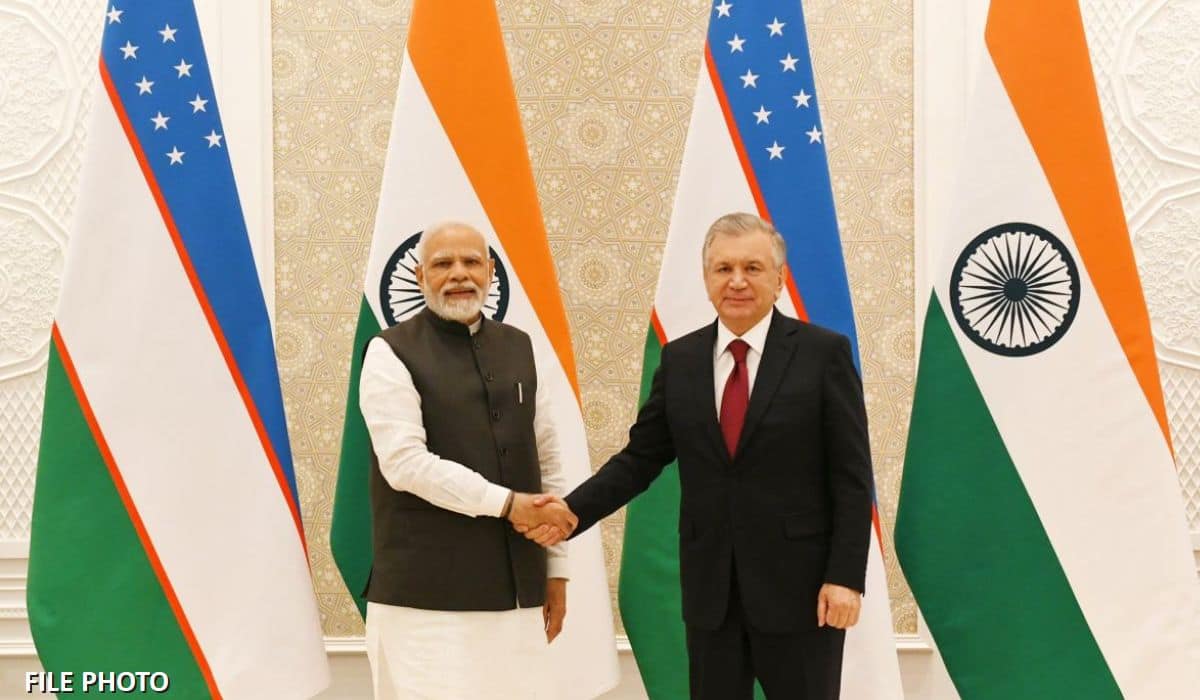Namaskar!
The first All India Annual State Ministers' Conference on Water holds immense importance. Today, India has been engaged in unparalleled work on water security; and is also making unprecedented investments. In our constitutional system, the subject of water comes under the control of the states. States' efforts towards water conservation will go a long way in achieving the collective goals of the country. Hence, 'Water Vision at 2047' is a vital dimension of the journey in the 'Amritkaal' for the next 25 years.
Friends,
It is quite natural and necessary to have discussions in this conference keeping the vision of 'whole of government' and 'whole of country' in mind. One aspect of 'Whole of government' is that all the governments should work as a single organic entity or one system. In the states too, there are various ministries like Ministry of Water, Ministry of Irrigation, Ministry of Agriculture, Ministry of Rural Development, Department of Animal Husbandry, the Ministry of Urban Development, and disaster management. So, it is very important to have constant communication, dialogue, clarity and a unified vision among all. If the departments exchange information with one another and have complete data, it will be helpful in their planning.
Friends,
We also need to understand that success is attained not with the efforts of the government alone. Those in government must shun this mindset that their efforts alone will yield the expected results. For success, we need to involve the public, social organizations and civil society as much as possible in the campaigns related to water conservation. There is another aspect of public participation and it is very crucial to understand that as well. Some people believe that public participation means putting all the responsibility on the people or promoting public participation reduces the responsibility of the government. However, this is not the reality. The government is no less accountable. The greatest advantage of public participation is that the public also comes to know how much money and effort are being put in this campaign. It has various aspects. When the public gets involved in a campaign, it becomes aware of the seriousness of the work, its potential, scale as well as the total resources being used. Consequently, when people see these things and get involved, be it a scheme like this or a campaign, a sense of ownership develops in them. And the Sense of Ownership is the greatest key to success. Now Swachh Bharat Abhiyan is the best example of the same. When people joined the Swachh Bharat Abhiyan, there was a consciousness and an awareness among the public. Different resources were needed to remove the filth. The construction of various water treatment plants, as well as toilets and many such works were done by the government. But the success of this campaign was ensured when the public and every citizen realized that no one should litter. A sense of aversion towards filth started growing among the citizens. Now we need to inculcate this idea of public participation in the minds of the people for water conservation. The more awareness we create among the people for this campaign, the more impact it will create. For example, we can organize 'Water Awareness Festivals'. Various events related to water awareness can be added to the fairs held at the local level. To make particularly the new generation aware of this subject, we must think of innovative ways from curriculum to activities in schools. You are already aware that the country is developing 75 Amrit Sarovars in every district. You have also contributed a lot in this endeavour in your state. In such a short span of time, 25,000 Amrit Sarovars have already been built. This is a unique campaign of its kind in the whole world in the direction of water conservation. And this involves public participation too. People are taking initiative; people are coming forward in this effort. To ensure conservation and public participation, we need to continuously expand our efforts in this direction.
Friends,
We must think beyond government policies and bureaucratic procedures to solve the problems related to water even at the policy level. We need to connect technology, industry, and start-ups to identify problems and find solutions. Technologies like geo-sensing and geo-mapping can help us a lot in this direction.
Friends,
'Jal Jeevan Mission' is a major development parameter of the states to provide water to every household. Many states have done a commendable job in this direction while many other states are moving forward towards the same. Now we need to make sure that once this system is in place, even the maintenance must be done equally well. Gram Panchayats should lead the Jal Jeevan Mission; and once the work is completed, they should also certify that sufficient as well as clean water has been made available. Every gram panchayat can also submit monthly or quarterly report online regarding the number of houses in its village that are getting tapped water supply. To ensure that the quality of water is up to the mark, a system of periodic water testing should also be developed.
Friends,
We all know that industry and agriculture are two such sectors which naturally require a lot of water. We should run a special campaign among the people associated with both these sectors to make them aware of water security. Crop-diversification should be done on the basis of availability of water. Natural farming should be done and promoted. It has been observed in various places that wherever natural farming is being done, there has been a positive impact on water conservation.
Friends,
Under the Pradhan Mantri Krishi Sinchai Yojana, work is being done at a rapid pace in all the states. Under this scheme, the Per Drop More Crop campaign was started. Under this scheme, so far more than 70 lakh hectares of land in the country have been brought under micro-irrigation. Micro-irrigation should be promoted continuously by all the states. This is extremely crucial for water conservation. Now pipeline based new schemes are being introduced in place of direct canal. This needs to be taken even further.
Friends,
For water conservation, the Centre has started the Atal Bhujal Water Conservation Scheme. This is a sensitive campaign, and it needs to be carried forward with equal sensitivity. It is also necessary that the authorities set up for groundwater management work earnestly in this direction. Water-shed work is necessary on a large scale in all the districts for groundwater recharge. And it is desired that most of the work in MGNREGA is associated with water conservation. The programme to revive the spring shed has been started in the hilly areas. Work on it needs to be expedited. It is equally important to expand the forest areas in your state for water conservation. For this, the Ministry of Environment and the Ministry of Water should work hand-in-hand. In order to provide sustainable water, attention should also be paid to the conservation of all local sources of water. Gram Panchayats should also chalk out an action plan for themselves for the next 5 years, keeping water in focus. It should include a roadmap for water supply, cleanliness and waste management. Water budget has been prepared at Panchayat level in some states on the basis of how much water is required in which village and the type of work required for the same. This can also be adopted by other states. In recent years, we have seen that the 'Catch the Rain campaign' has created quite an attraction. But for its success, a lot needs to be done. It is essential that such campaigns should become a natural part of the day-to-day activity of the State Governments. It should become an essential part of the annual campaign of the state governments. And instead of waiting for the rains for such campaigns, it is very important to plan out everything before the rains.
Friends,
In this budget, the government has laid a lot of emphasis on the circular economy. Circular economy also plays a major role in the field of water conservation. When treated water is re-used, fresh water is conserved, it benefits the entire eco-system. That's why water treatment and water recycling are essential. States plan to increase the use of 'treated water' in various works. One can make best income out of waste too. You need to map the local needs and the plans have to be prepared accordingly. We must note one more thing. Our rivers and water bodies are the most important part of the entire water ecosystem. To ensure that none of our rivers or water bodies are polluted by external factors, we have to create a network of waste management and sewage treatment in every state. For the re-use of treated water, we also need to pay attention to an effective system. Keeping the Namami Gange Mission as a template, other states can also start similar campaigns for conservation and rejuvenation of rivers.
Friends,
Water should become a subject of collaboration, coordination, and cooperation among the states. This is the responsibility of all of us. And there is another issue - urbanization is happening at a rapid pace. Our population is rapidly moving towards urbanization. Urban development is taking place at such a fast pace that we will have to think about water from this very moment. We must think of Sewage system and sewage treatment from this very moment. We need to be faster than the speed with which the cities are growing. I hope we share everyone's ideas and experiences in this summit and hold a fruitful discussion. I hope that a definite action plan will be prepared and by making a resolution, you will move forward to achieve it. If every state ensures the welfare of the citizens of its state, while also emphasizing the duty of its citizens and prioritizing the government's work towards water, I can say with confidence that this water conference holds a lot of expectations and promises.
I wish you the very best.
Thank you.























